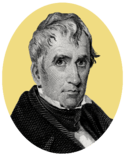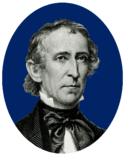1839 Whig National Convention
|
1840 presidential election | |
|
Nominees Harrison and Tyler | |
| Convention | |
|---|---|
| Date(s) | December 4–8, 1839 |
| City | Harrisburg, Pennsylvania |
| Candidates | |
| Presidential nominee | William H. Harrison of Ohio |
| Vice Presidential nominee | John Tyler of Virginia |
For the first time in their history, the Whigs held a national convention to determine their presidential candidate. It opened in Harrisburg, Pennsylvania, on December 4, 1839, almost a full year before the general election. After Daniel Webster dropped out of the race, the three leading candidates were General William Henry Harrison, a war hero, former senator and ambassador, and the most successful of Van Buren's opponents in the 1836 election, who had been campaigning for the Whig nomination ever since; General Winfield Scott, a hero of the War of 1812 who had been active in skirmishes with the British in 1837 and 1838; and Senator Henry Clay, the Whigs' congressional leader and former Speaker of the House and United States Secretary of State.
Presidential balloting
Clay led on the first ballot, but circumstances conspired to deny him the nomination. First, the convention came on the heels of a string of Whig electoral losses, and party members were anxious to reverse the trend. Harrison managed to distance himself from the losses, but Clay, as the party's philosophical leader, could not. Had the convention been held in the spring of 1840, when the continuing economic downturn caused by the Panic of 1837 led to a string of Whig victories, Clay would have had much greater support. Second, the convention rules had been drawn up so that whoever won the majority of delegates from a given state would win all the votes from that state. This worked against Clay, who could have combined solid majority support in almost all the Southern delegations (with little potential for opponents to capitalize on a proportional distribution of delegates), and a large minority support in Northern delegations if the rules allowed counting of individual delegate votes. Third, several Southern states whose Whig party organizations supported Clay abstained from sending delegates to the convention.
Harrison won on the fifth ballot after Clay delegates from Virginia and Scott delegates from New York combined to switch their support to Harrison.
The state-by-state roll call was printed in the newspaper the Farmer's Cabinet on December 13, 1839:
| Presidential vote | 1 | 2 | 3 | 4 | 5 | Vice Presidential Vote | 1 |
|---|---|---|---|---|---|---|---|
| William H. Harrison | 94 | 94 | 91 | 91 | 148 | John Tyler | 231 |
| Henry Clay | 103 | 103 | 95 | 95 | 90 | Abstaining | 23 |
| Winfield Scott | 57 | 57 | 68 | 68 | 16 |
Vice presidential nominee
Because Harrison (born in Virginia) was considered a Northerner (as a resident of Ohio), the Whigs needed to balance the ticket with a Southerner. They also sought a Clay supporter to help unite the party. After being turned down by several Southern Clay supporters, the convention finally found a Southern nominee who had faithfully supported Clay throughout the convention and who would agree to run: former Senator John Tyler of Virginia, who had previously been the running-mate of Hugh Lawson White and Willie Person Mangum during the four-way Whig campaign at the previous election.[1]
Aftermath
During the balloting, Clay and Scott played cards with Whig politicians John J. Crittenden and George Evans at the Astor House hotel in New York City. When the group received word of Harrison's victory, Clay blamed his loss on Scott and struck him, with the blow landing on the shoulder which had been wounded during Scott's participation in the Battle of Lundy's Lane. Afterwards Clay had to be physically removed from the hotel room. Scott then sent Crittenden to Clay with Scott's challenge for a duel, but Crittenden reconciled them by convincing Clay to apologize.[2]
References
- ↑ Witcover, Jules (2014). The American Vice Presidency. Smithsonian Books. pp. 100–101.
- ↑ Eisenhower, John S. D. (1999). Agent of Destiny: The Life and Times of General Winfield Scott. Norman, OK: University of Oklahoma Press. pp. 205–206. ISBN 978-0-8061-3128-3.

